34 Private Label Vs Brands
Private brands, also known as private label and store brands, are made and sold for a specific retailer and meant to compete with brand-name goods. Private brands tend to be cheaper than name. "Shoppers realize that name brands no longer guarantee better quality and there is a significant decline in the gap between private label and brand name over the past few years. When it comes to differentiating the product itself, packaging might be the only thing left for name brands to stand out.
With white label manufacturing, the retailer is able to charge a premium on the product by attaching their existing brand because of their position in the marketplace. Private Label Vs. White Label. While private labeling and white labeling are similar, subtle differences distinguish the two.

Private label vs brands
In 2018, private label brand sales across the outlets measured by Nielsen rose to $128.6 billion from $123.1 billion five years ago, while unit volume rose to 46.2 billion from 44.8 billion. The Private Label Manufacturers Association just released its 2019 private label yearbook which reports retail sales of consumable private label brands rose 4.4% in 2018, as compared with 1.1% by. Very good brands have strong ties with their customer base and woe betides anyone that gets in the way. Equally the consumer is also far more open now to own and private label brands and if anything would like to see more choice, differentiation and see the retailers bring their flair and imagination to a heavily branded category.
Private label vs brands. Private label brands are usually cheaper than other branded products. This is because customers don't have to pay for mass marketing campaigns and the other costs national brand items may face. Local products coming from local producers also typically have lower transportation costs. This doesn't mean every private label brand is cheaper. Answer (1 of 2): There is a common misconception about the difference between private label brands and in-house brands. Usually, the manufacturer sells their products to customers through distribution channels. Earlier retailers as well as wholesalers sold only these products to the customers. T... How real is the private-label threat to branded products? What should national-brand manufacturers do about it? On the one hand, manufacturers have reason to be concerned. There are more private labels on the market than ever before; collectively, unit share of store-brand goods place first, second, or third in 177 of 250 supermarket product categories in the United States. Jul 23, 2018 · Private “Label” vs. Private “Brands”. July 23, 2018. July 22, 2018. ~ David J. Katz. Let’s be careful not to confuse private “labels” with private “brands.”. Private label merchandise is generic goods, sold as a commodity (and commodities have price as their value proposition). Private brands, when properly executed, are truly brands, exclusive to a retailer or channel of distribution, with distinct brand attributes, supported by significant marketing.
Private Label Brands (yellow) The mid Private Label brand (PL#1), which is lower in price, with a mid to low perceived consumer value. Next is our generic label, or PL#2. It is low priced and lower perceived value. Remember that these two brands interact, so if PL#1's pricegap is too high, consumers may switch to the lower priced generic brand. Contract Candy Manufacturing vs. Private Label Candy Manufacturing. Contract candy manufacturing and private label manufacturing are similar in some ways, but different in other significant ones. They’re alike in that the purpose of both processes is to make an end product that will be sold to consumers, regardless of whether the end buyer is an individual person or another business. Very good brands have strong ties with their customer base and woe betides anyone that gets in the way. Equally the consumer is also far more open now to own and private label brands and if anything would like to see more choice, differentiation and see the retailers bring their flair and imagination to a heavily branded category. Brands Versus Private Labels: Fighting to Win The Private-Label Threat. Several factors suggest that the private-label threat in the 1990s is serious and may stay... Brand Strength. Taken together, these trends may seem daunting to manufacturers of brand-name products. But they tell... If You Don’t,.
Private label brand strategy is perfectly suited for - and works best when combined with - an eye toward uniqueness, mesmerization, and innovation. Such a strategy works quite well in collaboration with independent manufacturers and vendors who are more than willing to join forces to push the envelope on enhancing products that tantalize. It's clear why shoppers like store brands. Private labels are cheaper than their name brand counterparts, and in categories where the store brand and name brand are virtually identical, buying private label is a way to save pennies without sacrificing too much. And during these recessionary times, those pennies are worth a lot to many consumers. If you (try to) combine branded and private label production into 1 company, I see two things going wrong. First, we often find that the service requirements for private label are more stringent than for branded products and with less information sharing, especially from the side of the hard discounters. However, we don’t have the margins on these products to pay for that. Private label brands do not build credibility and specificity of being associated with only one type of product; no one thinks that a private label brand is the best at making any given product. But effective store brands are still meaningful because they are a consistent alternative for shoppers who value a specific product feature.
Very good brands have strong ties with their customer base and woe betides anyone that gets in the way. Equally the consumer is also far more open now to own and private label brands and if anything would like to see more choice, differentiation and see the retailers bring their flair and imagination to a heavily branded category.
Private label products, otherwise known as store brands or retailer brands, can be found at a wide variety of retailers. Some private label products, which includes everything from pet food to aspirin, are much more obvious than others. The major improvement in packaging was the first step in the success of private label.
Answer (1 of 2): There is a common misconception about the difference between private label brands and in-house brands. Usually, the manufacturer sells their products to customers through distribution channels. Earlier retailers as well as wholesalers sold only these products to the customers. T...
Private label offerings end up in a manufacturer's strongest accounts It is hard for the company to focus on both brands. Demand for private labels from the retailers. 4.Private-label manufacturing cannot be contained, and inevitably it may cannibalize national-brand sales.
Amazon owns over 100 private label brands that operate in dozens of markets on its site, including food and beverage, automotive, clothing, and electronics. Similarly to private label brands we see in brick-and-mortar stores, Amazon brands often create products similar to name-brand best-sellers on the site and sell them for a low price.
White Label vs Private Label vs. Reseller Products Compared: Let's start with products first: (or jump to White Label vs. Private Label Services) Private Label Products: A private label product is manufactured by a contract or third-party manufacturer and sold under your brand name. As the buyer, you specify everything about the product.
Th e terms private label and branded products are quite popular in the e-commerce world. Although there are now more private labels on the market than ever before, creating a private label isn’t right for every company.. At some point, every business owner needs to decide what type of name they want their product(s) or service(s) to carry.
Difference between Manufacturers Brands and Own-Label Brand are as follows: Traditionally, manufacturers branded their products and sold them to customers by using the distribution channel. Wholesalers, distributors and retailers sold only the manufacturers' brands. Manufacturers were thus able to exert control over these distribution channel.
Notably, shops with 1 - 3 bays are less likely to know the brand in the private label box (2.2%). 42.6% of auto repair shops said their 1st call supplier carried categories where the majority of the brands offered were private label with few national branded options. Of that 42.6%, 22.8% said they go to another supplier to purchase nationally.
The Evolution of Private Brands. Shopping studies demonstrate how private brands are gaining ground versus national brands. Consumers in recessionary times are more open to new brands and less attitudinally loyal. This paper shares 10 key considerations for retailers.
In 2018, private label brand sales across the outlets measured by Nielsen rose to $128.6 billion from $123.1 billion five years ago, while unit volume rose to 46.2 billion from 44.8 billion.
A recent rise in private-label product success is forcing national brands to compete for their share of the retail market. With low prices and high quality, private-label products have gained popularity and shed their negative stigma in the last decade.
In 2020, the market share of private label brands in the United States was 19.5 percent. Over that year, retail sales of consumer packaged goods sold under store brands in the United States.
Private labels have also been used to take a stand against powerful brand owners and to increase profits. Supermarkets often attract customers through offering leading brands at highly competitive prices. Margins on such brands are, therefore, often low. Establishing a private label enables supermarkets to generate a higher profit margin.
Private Label Growing in All Channels. According to the PLMA, "private-label sales grew 2.5% in 2014, versus 1.1% for national brands." A Wells Fargo analyst John Baumgartner reports Kroger's projection that its Simple Truth private label brand, now at approximately $1.2 billion in annual sales, may double in the next few years.
Private label brands (or own brand labels) are products sold by a retailer with its own packing, but manufactured by a third party. For example, Tesco sell ordinary branded items, such as Heinz baked beans, but also sell their own 'Tesco Value' baked beans. Tesco will license a manufacturer to…
The Private Label Manufacturers Association just released its 2019 private label yearbook which reports retail sales of consumable private label brands rose 4.4% in 2018, as compared with 1.1% by.
3. Private labels in the United States command higher unit shares than the strongest national brand in 77 of 250 supermarket product categories. 4. But, private-label strength generally varies with economic conditions : 5. Private- label market shares generally goes up when the economy is suffering. E C O N O M Y.


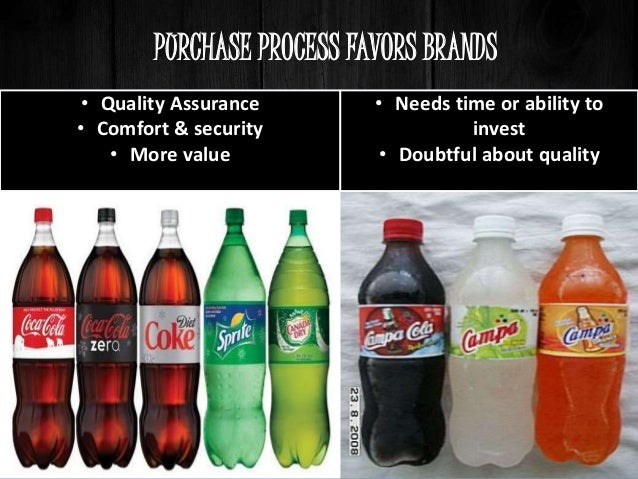



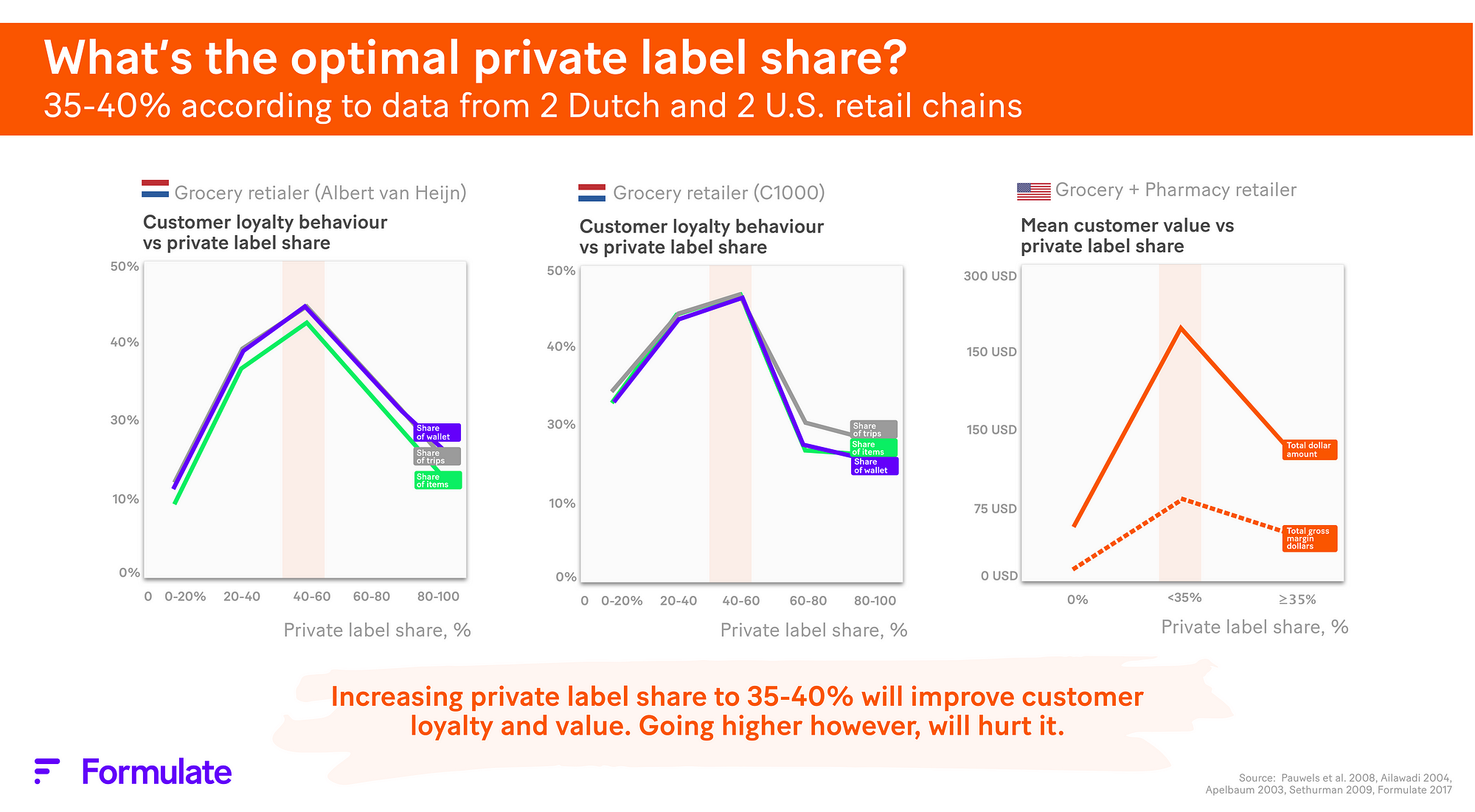



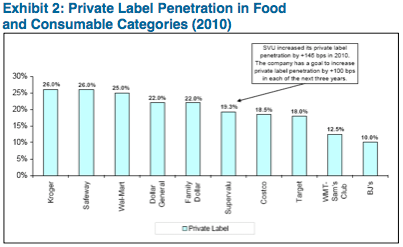

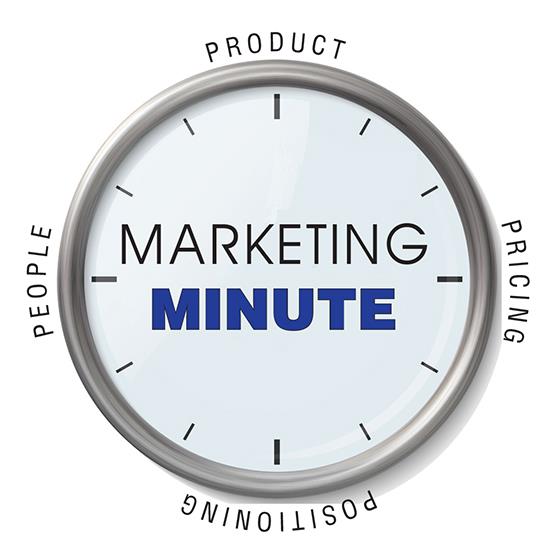

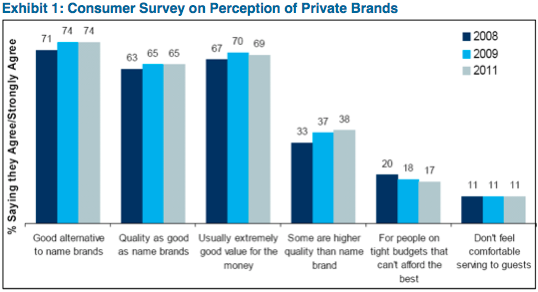
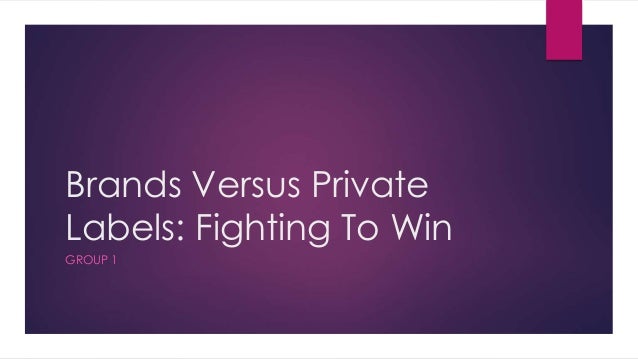










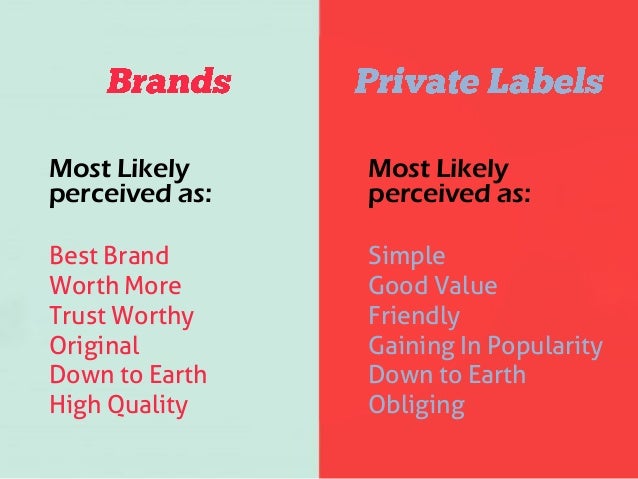
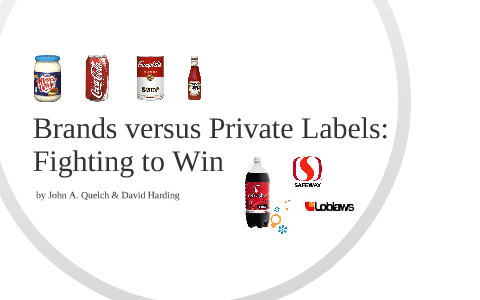
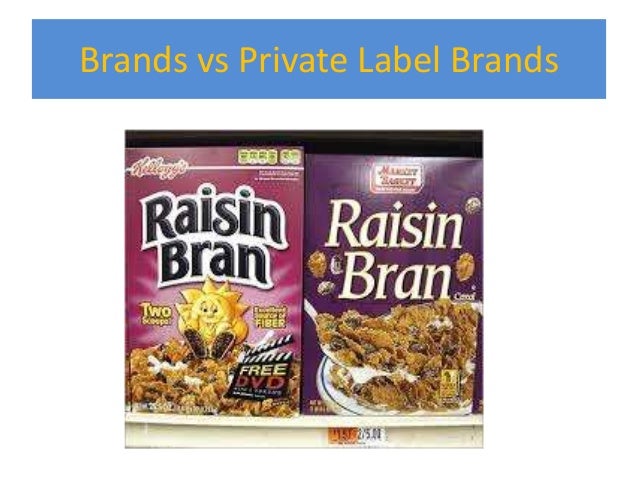

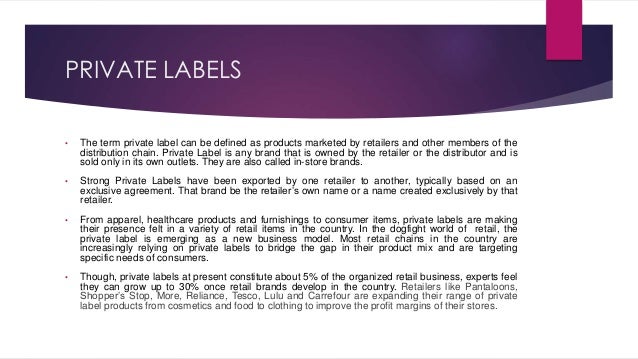
0 Response to "34 Private Label Vs Brands"
Post a Comment